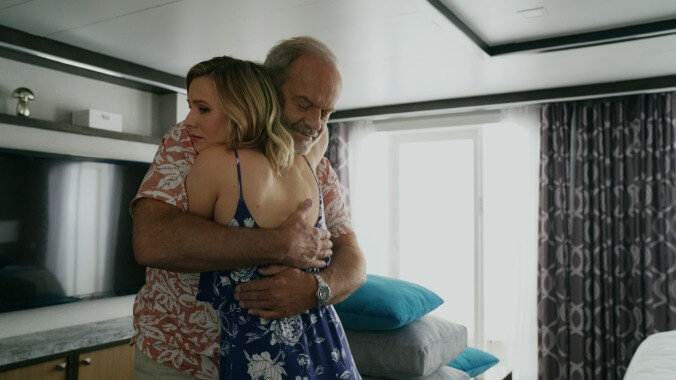Lauren Miller Rogen obviously appreciates romantic comedies, and thinks a lot about how their structures can be applied to material not focused exclusively on romantic love. For a Good Time, Call…, which she wrote and starred in, is a comedy of sex and romance rejiggered to emphasize (platonic) female friendship. Now Like Father, her first feature as a director, opens with a litany of modern romantic-comedy signifiers: the credits rolling over the New York skyline, a type A professional woman who can’t put down her smartphone, and a wedding that goes spectacularly wrong. Like Father has a hell of a rom-com hook, too: Rachel (Kristen Bell), that type A professional with the busted-up wedding, goes on her Jamaican-cruise honeymoon anyway, and winds up bonding with a near-stranger. Rogen again futzes with the formula when she makes that near-stranger Rachel’s dad, Harry (Kelsey Grammer).
Netflix viewers could be forgiven for assuming Grammer is taking over a role originated by Gérard Depardieu. But Like Father isn’t a lascivious cringe-farce. For the most part, it’s barely a comedy at all, first by choice and then for other, more disappointing reasons. Despite the rom-com trappings out front, the movie doesn’t self-consciously revel in genre excesses. If anything, it tries to stay grounded even as it assembles a high concept. Rachel’s New York apartment is nice, but not cartoonishly big. Her all-consuming job as a branding executive isn’t grotesquely caricatured (her boss, played by Brett Gelman, isn’t even especially demanding, though he does officiate her ill-fated wedding). And her breakdown when her fiancé leaves her at the altar isn’t overacted by Bell.
Enter Harry, after a 25-year absence, offering a drink and a shoulder to cry on. Rachel takes him up on the former, and after they get blackout drunk together, they wake up on the cruise ship. Harry is eager to explain why he’s been out of his daughter’s life for so long, and Rachel is eager to ignore him and check her work email, but they decide to make the best of an awkward situation and hang out on the boat, at least until they can fly home from Jamaica in a couple of days.
Perversely, it’s only after Like Father is in the clear from its potentially ridiculous set-up that it really starts to trade in phony sitcom-movie bullshit. Rather than letting the father/daughter story develop on its own, Rogen introduces a cast of supporting couples, assigned to Rachel and Harry’s meal table, who immediately cross the line from cute into cutesy, failing to garner so much as a single laugh along the way. Rachel also meets an endearingly nerdy Canadian (Seth Rogen, the filmmaker’s husband) who the movie tries to use to subvert expectations of romance but actually serves to point out how charming it would be if Bell and Rogen did star in a genuine romantic comedy together.
Instead, the talented Bell has to push past a few funny flirtation scenes and work her way through a character who mostly exists to receive the movie’s relentless judgments over her dedication to her career, to the point of having her appear nonsensically desperate for a promotion she seems to be in no danger of losing. Ultimately, the movie treats Rachel like a boldly unlikable female lead rather than a person with a job. This feels especially akin to a pile-on because Grammer’s Harry enjoys a kid-glove sensitivity befitting a longtime sitcom star who’s fine with looking a little bit foolish but not remotely indecent. On Frasier, Grammer at least had the courtesy to alternate the stoking and puncturing of his ego. Here, Harry must be revealed not just as a redeemable guy who made a series of mistakes, but a great guy who deeply regrets his one and possibly only mistake. He explains himself in a scene where Bell has an emotional breakthrough so sudden and unearned that it may qualify as the least convincing bit of acting she’s ever done.
To her credit, Rogen’s movie looks a touch more cinematic, and less like a digitally amped TV movie, than a lot of other Netflix projects. Perhaps this is thanks to a generous endowment from Royal Caribbean International, which provides not just a setting and sets but the subjects of many shots and lines of dialogue, in the form of the ship’s lovingly, uncritically depicted amenities. It’s enough to remind Adam Sandler to call his travel agent and book his next movie as soon as possible. Then again, Sandler’s previous Netflix movie was a much funnier and sweeter father-daughter story, with few if any Hawaiian shirts. Rogen has shown herself as a thoughtful, funny filmmaker; she can do better than picking up where Sandler’s worst movies left off.

 Keep scrolling for more great stories.
Keep scrolling for more great stories.
